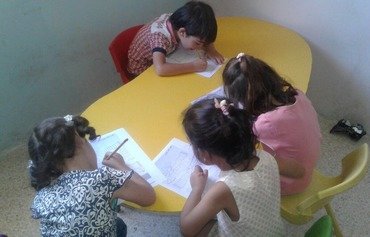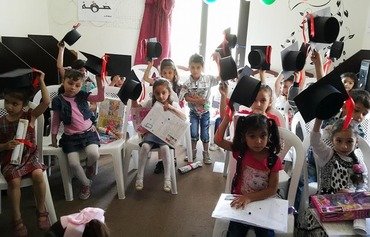Two educational game applications rolled out this month in Lebanon are designed to help struggling or out-of-school Syrian refugee children learn to read Arabic and improve their basic language skills.
The Norwegian Embassy in Lebanon launched the free games for smartphones --Antura and the Letters and Feed the Monster -- on May 9th.
The two games were winners of the EduApp4Syria competition, which solicited smart solutions for educating Syrian children.
The development of the apps was supported by the Norwegian Science and Technology University, the US Agency for International Development (USAID), World Vision, the Australian government and UNICEF.
According to UNICEF, the apps aim to educate children, even during crises, and specifically target Syrian children.
About 2.3 million Syrian children are out of school in their homeland and in neighbouring countries, UNICEF said, with more than 30% of Syrian refugee children in Lebanon currently out of school.
Antura and the Letters, developed by Lebanese company Wixel Studios, was chosen from among 78 bids presented to an international panel of experts.
The panel comprised Arabic language and literacy experts, psychological and social well-being specialists, and game development and digital education experts.
Learning through gaming
Wixel Studios co-founder Ziad Feghali told Al-Mashareq the Antura and the Letters game was selected for development because of its high quality and audience-appropriate teaching methods.
"Antura and the Letters is a free and fun game for smartphones that teaches basic Arabic language skills to children between the ages of 5 and 10," he said.
The app also includes a suite of mini-games and quizzes to reinforce educational concepts, including "letter and phonetics recognition, letter decoding, word structure, vocabulary and oral fluency", Feghali said.
The content "is based on the Syrian national curriculum for primary grades, including, for example, Arabic alphabet phonetics of vowels and consonants, the shapes and sounds of the letters, their pronunciation and how to assemble them [into words]".
Lessons include the standard Arabic alphabet, more than 350 words, including 275 nouns, each with its own image, in addition to more than 50 sentences.
Feghali said the app features "32 fun games covering the entire Arabic primary school curriculum, 12 types of quizzes to test and reinforce each subject a child learns, and the ability to customise the Antura character with 500 different item combinations".
Feed the Monster, developed by Rhino Games Studio, features a world with friendly monsters who have been turned into eggs with an evil charm.
To help the eggs containing the friendly monsters hatch, the player must feed them with correct letters, syllables and words.
Targeting out-of-school students
The launch of the new educational games "comes at a time when hundreds of thousands of Syrian students are still out of school", Lebanese Education Minister Marwan Hamadeh told Al-Mashareq.
Children who are not in school are at risk of drifting towards extremism, he said, adding that education can help to inoculate children against this ideology.
The main advantage of this new educational tool, "is that it reaches out-of-school children in the communities in which they live", Hamadeh said.
The apps are an educational and entertaining tool that are "not confined to a specific time and place", such as school classrooms, he said, as students are able to use them in their home environment as well, with family and friends.
The apps are "gradually being adopted by public school as a means to educate Syrian students and as a lever to reach Lebanese students through modern means", Hamadeh said.
They also provide "added value to the efforts made by the Lebanese Ministry of Education to provide an education to Syrian students and Lebanese students with learning difficulty", he added.
Beyond this, he said, the apps will help students in many Arab countries.
A tool that makes lessons fun
Antura and the Letters piqued the interest of students at the Uruguay Public School for Boys in Ashrafieh at its official launch ceremony.
Lebanese student Silvana Merhi, 7, and Syrian students Salloum Khalifa, 10, and Jana Haraki, 9, described the app as a "useful game" that will help them learn the Arabic language in a better way.
School principal Rachel Chidiac said the game is "an additional and effective tool, teaching Syrian students in a fun way that takes their minds away from the consequences of the war and sad atmospheres in their homes".
The Uruguay Public School holds classes for 334 Syrian students before noon and 381 in the afternoon.
"The importance of the app lies in its educational and interactive games that help students to learn in an enjoyable way," Chidiac told Al-Mashareq, adding that it also is important for schools to keep abreast of new technology.
The school’s administration will devote a class session to playing the game, because it helps students "learn the Arabic language with a tool that speaks to the future", she added.

![Lebanese Education Minister Marwan Hamadeh assists children with a new educational app at the Uruguay Public School in Ashrafieh. [Nohad Topalian/Al-Mashareq]](/cnmi_am/images/2017/05/17/7906-Lebanon-minister-school-600_384.jpg)






